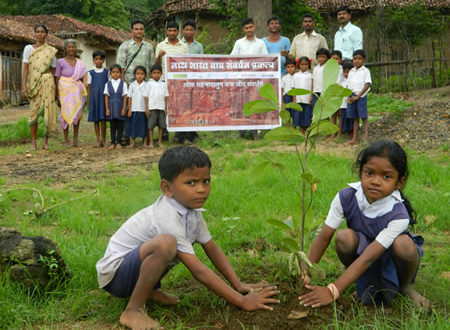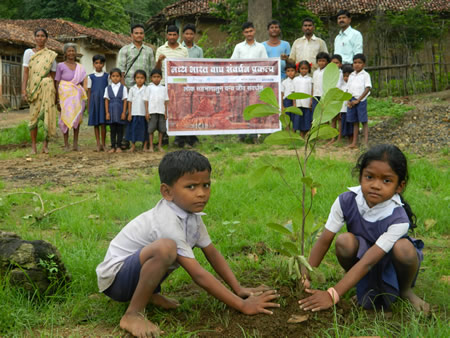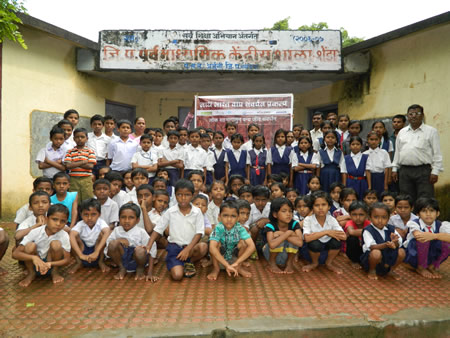Children plant over 500 fruit and shelter trees to reduce dependence on forest
The best time to plant a tree was 20 years ago. The next best time is now.
– Chinese proverb
Gondia (Maharashtra), Oct 4, 2013: Over the last two months, school children in the Nagzira-Nawegaon corridor in the Central Indian tiger landscape have taken a step further to a greener livelihood by participating in a sapling plantation drive.
As part of Wildlife Trust of India’s Central India Tiger Conservation Project, students from 14 schools in 15 corridor-dependent villages, participated in the drive. The project supported by Wetland International, Both Ends, IUCN Netherlands, Maharashtra Forest Department and Japan Tiger and Elephant Fund, works to secure a contiguous tiger habitat in central India.
Of the 90 villages in the corridor, the 15 selected in this programme are closest to the Portected Area, and highly dependent on the forest. These villages within the corridor cause severe anthropogenic pressures on the forest, and one of the prerogatives of the project is to reduce the human dependence on the corridor. Apart from this, the project also aims to control wildlife trade, study tiger distribution in the corridor area and mitigate human-animal conflict among other conservation work.
Children – between 5 and 18 years of age – came together to plant 524 fruit and shelter tree saplings in their schools. Some that didn’t have enough space in school even took the saplings and planted them near their homes in the village.
The drive was supported by the Gondia Forest Department (Territorial), who provided the saplings, which included Jamun (Syzium cumini), Behda (Terminalia ballerica), Chironji (Buchanania lanzen), Ritha (soap nut) (Sapindus Mukorossi), Bel (Aegle mermelos) and Chich bilai or Jungle jalebi (Pithecellobium dulce) among a total of 11 species of indigenous plants.
“We initiated this tree plantation drive last year to increase the number of fruiting and shelter trees in the village last year,” said Anil Kumar Nair, WTI Field Officer. “We approached the families in the villages then. This time we approached the children, who will learn the need for more trees, especially the local fruit species and take the message back to their parents.”
“Children are very sensitive and we need to inculcate the right values at this stage,” said the project’s manager Prafulla Bhambhurkar. “They are the force we can use for social change and we need their support in protection of the environment. This is a small step in that direction.”
To keep the students motivated to look after the plants, WTI also announced a reward for the students in each school that best maintains their plants, which will be judged a year from now. A prize will also be given to the school with the best plantation.











